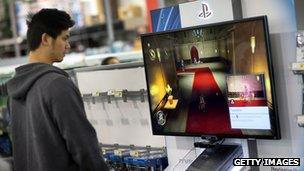Consoles: One box to rule them all?
- Published
- comments
The BBC's Rory Cellan-Jones reports on the gaming battle between PlayStation 4 and Xbox One
A titanic battle for the living room is under way, as Microsoft's Xbox One and Sony's Playstation 4 try to offer us the all-purpose device that will give us all the entertainment we need. The convergence we've been told about for years is happening and it looks like a games console.
Well, that has been the narrative for quite a while - but I'm not so sure it is true any more. I've a hunch that the quest to produce one box that will be all things to all people may be doomed to failure. Or at least may end up as a minority pursuit.
But Microsoft isn't buying that - after all its Xbox One is just the latest move by the software titan to try to put itself at the centre of the living room. It started with the PC - Windows Media Centre was first released back in 2001, and since then I've been shown around any number of Microsoft-connected homes with a computer nestling under the TV. What I haven't seen is any real homes with a similar setup.

Coming to a living room near you

All you need?
But the Xbox has been a more successful launchpad for the company's living-room ambitions, especially since the launch of Kinect, which brought voice and gesture control to TV as well as game play. Now that has all been made far more sophisticated in the Xbox One, with a new interface allowing you to hook up the console to your cable or satellite box and play live TV through an interface that feels like Windows 8.
Sony has long had similar ambitions for its console, and with the Playstation 3 appeared to score a significant victory over Xbox when its Blu-Ray format - a key feature of the device - won out against the rival HD-DVD. That made it more expensive than the Xbox 360, but with its music and movie divisions supplying plenty of content, Sony appeared well placed to move ahead of Microsoft and put itself at the centre of the multimedia home.
But somehow, it seemed that the game-playing experience rather than anything else remained the core reason why anyone bought a console - and the PS3 and the Xbox 360 were pretty much neck-and-neck in sales over the years.
And Microsoft was forced to beat a hasty retreat earlier this year when its first unveiling of the Xbox One put a heavy emphasis on its multimedia skills. Hardcore gamers - always likely to be the early adopters - made their displeasure felt, and now the marketing has changed. When I interviewed a Microsoft executive this week he was keen to stress that the new Xbox was the best place to play games - oh, and yes, it did all sorts of other cool stuff too.
Sony, by contrast, has been consistent in marketing the Playstation 4 as a games machine - its motion sensor camera comes as an extra rather than being core to the experience like Microsoft's Kinect. This approach seems to have worked, with a record-breaking launch in the US and more advanced orders for the PS4 in the UK than for the more expensive Xbox One.
Both consoles seem destined to do well - but neither is likely to replace all the other boxes under the TV in most homes. Whatever the industry may tell you about the ever widening audience for games in all their forms, many people just won't want an Xbox or Playstation controller to be their route into a night in front of the telly. And having tried the Xbox One's voice control, it is clever, but in my view not quite intuitive enough to persuade an older person like me to throw away the remote control.
And there's the dilemma for Microsoft and Sony - pleasing traditional gamers while fulfilling their ambitions to rule the living room may not be possible. Keen gamers will be happy enough to have all sorts of other bells and whistles with their consoles but will rarely use them.
But in households where there's a combination of active gamers and passive TV viewers - probably most of them - there could be friction. Imagine a scene where a teenager is playing FIFA when mum walks in and shouts "Xbox - go to live TV". Not pretty.